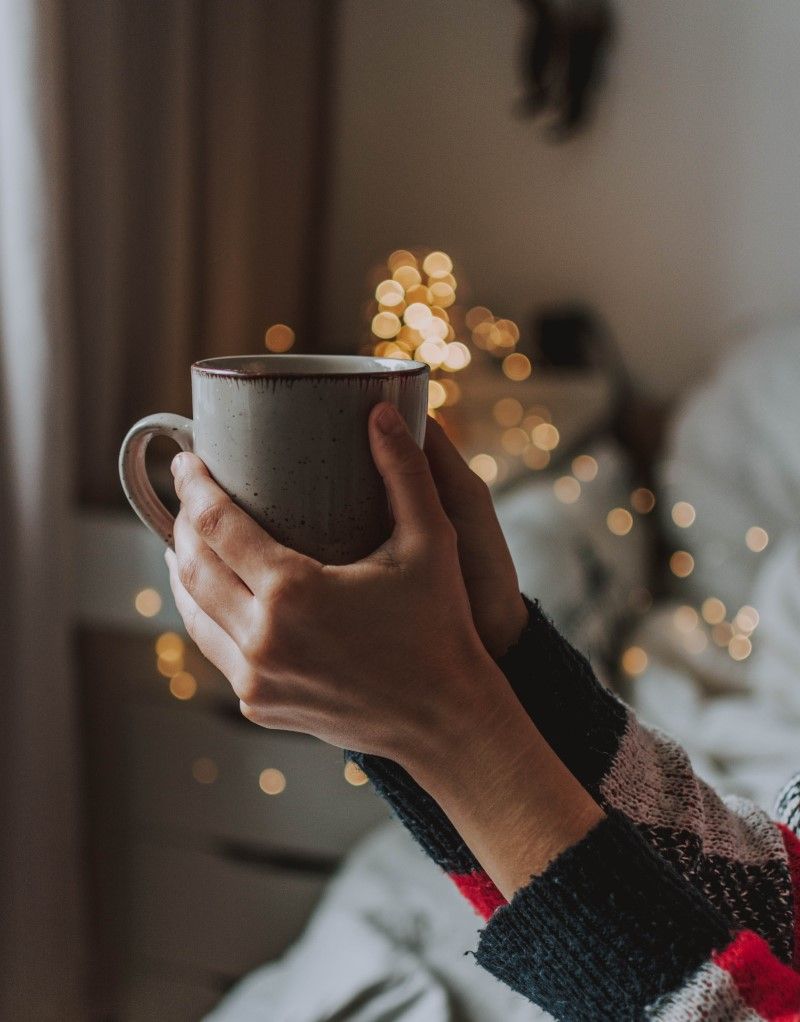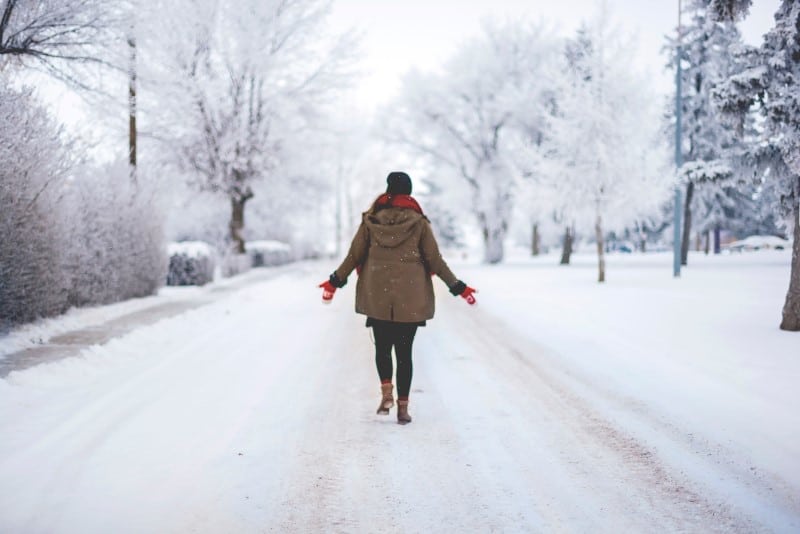I love the holiday season. But when it’s over, I’ve often felt like Times Square looks after the crowds disperse in the early hours of New Year’s Day. In short, kind of a mess: exhilarated, exhausted, and still reverberating with all the sights, sounds, and emotions of the holiday. In other words, I’d feel as if I needed a reset and a clean-up crew.
I thought this feeling was inevitable.
For years I faced the holiday season as if it was college finals week and I was an undergrad. I’m an introvert—and as much as I love people and holidays—I thought I had to just “power through” until January. To complicate matters, my husband and I always travel to see our families for Thanksgiving, Christmas, and often, New Year’s. Our families live in opposite directions, in different states, so we’ve made multi-day trips for nearly every winter holiday in the past decade.
Every holiday I would pack my bags and leave my routine behind, telling myself: It’s only a few days. Of course we’ll arrive early and stay late. Of course I’ll stay up as late our host even if it’s way past my usual bedtime. Of course I won’t take any time for myself. Of course I’ll snack endlessly on whatever is near my hands. And of course, I’ll stop all forms of exercise. The result was that I’d return home from these holiday visits exhausted, ornery, and people-weary with no clean pants for the next day. It’d take me a week of steady routine—including hours of solitude and a few loads of laundry—to recover.

My anticipation of an “introvert holiday hangover” had started to dampen my enthusiasm for a time of year I genuinely loved. Staying home was an option, but not one we were likely to choose. We do like our families and the time we spend with them. (Plus when you don’t have kids—like us—I think it can be harder to justify staying home for the holidays. It’s easier to say: “I want my kids to experience Christmas morning at our own house,” than, “Um, I want to experience Christmas morning at our own house.”)
My new approach to the holidays came with a mindset shift that began in 2013. That year I read Quiet by Susan Cain, a book that’s since become a touchstone for introverted people. It was the first time I realized: 1) I’m an introvert and 2) It’s okay to care for that part of my personality. With Cain’s voice in my head—and the help of a good therapist—I began to consider the behaviors that helped me to be physically, emotionally, and mentally healthy.
Over the next few years, I made changes to how I lived. (It’s worth noting that during this time, I was also navigating an anxiety disorder diagnosis. Learning to respect my introversion was one of many things that helped me regain stability and wellness.)
One thing that became clear during this process is that when the holiday season arrived, I ditched my healthy habits, routines, and boundaries. For a long time, I thought these things were selfish. But experience has taught me they’re not. When I take care of myself, I have more mental and emotional energy. I feel kinder, more patient, more open. More present and able to connect.
To that end, I’ve come up with a list of things that make the travel and endless extroversion of the holiday season easier for me. I know there are plenty of fellow introverts out there but I also think these ideas can be helpful for anyone—introvert, extrovert, or indifferent:

Make room for the spiritual.
Because I’m a Christian, this is the time of year I celebrate God’s arrival in this world and my hope for the future because of it. Shifting my mind to a deep spiritual truth like this isn’t something I can do in a hurry or with a lot of background noise. It takes time and intention.
Growing up, I didn’t attend a church that observed Advent but I do now. I’ve found that it’s a beautiful and thoughtful way to prepare for Christmas. (If Advent is new to you, Tsh has written a lot about it—including this recent post.)
In addition to celebrating Advent at church on Sundays, I also create space for it in my everyday life. I’m an early riser. Every morning, I make coffee, grab a blanket, and head to the same spot on my sofa. Throughout the year I use this time to read, journal, pray, stare out the window.
But during Advent, I shift my focus to Advent-themed readings and practices. Last year, I watched a four-part Advent series from The Bible Project, a nonprofit started by one of my former pastors. Each week, I’d watch the short video, then spend some time writing and reflecting on the theme.
Schedule solitude.
Solitude doesn’t usually happen unless we schedule it. I used to treat solitude as if it were a reward for being productive. I’d think: If I complete these things on my to-do list, then I can take some time for myself. Again, it was a therapist who set me straight on this. Solitude isn’t a reward. It’s a human need. One of the big benefits of solitude is that it helps to regulate our emotions—which seems especially important this time of year.
There are different opinions on how to define solitude. In his book Digital Minimalism, Cal Newport says that solitude is a time that’s free from all forms on input (including podcasts, audiobooks, and reading). In a recent New York Times article, the definition is a bit more flexible. For me, solitude is time I spend alone—without my phone—doing some of the following things: going for a walk outside, painting, journaling, baking, reading. This list will likely look a bit different for everyone.
Take a break.
In addition to scheduling solitude, I’ve found that it’s important to take short breaks in the midst of social activities or long family weekends. I have a friend who takes naps during family holidays. During the afternoon lull, she heads to a guest room and closes the door. Sometimes she sleeps, and at other times she simply reads for a while. She’s discovered that she’s a happier, more patient person because of these short self-imposed breaks.
Her habit has inspired me and now I give myself permission to do something similar. Sometimes I’ll go to a quiet room and do a short meditation on my Calm app, read, take a quick nap, or I’ll go for a walk with just one other person.

Care for your physical needs.
Another way of saying this is: Don’t neglect your healthy habits. It seems like a no-brainer but it’s taken me years to notice the connection between basic self-care—drinking water, limiting my sugar intake, being active, getting adequate sleep—and how I feel mentally and emotionally. Now when I travel for the holidays (and even when I don’t), I try to remember these basic building blocks of good health. I bring a water bottle with me. I keep my regular habit of running, walking, or yoga. And I go to bed at my usual time because I know how restorative sleep can be.
Give yourself margin.
I can’t tell you how many times I’ve spent holidays with family and stay as long as humanly possible. Especially when I was single, I’d arrive home late Sunday night, crash, and then wake early for work the next morning. It felt like a challenge, as if I was proving that I was superhuman.
Now I know the importance of margin and try to plan for it. Downtime at home between travel and the workweek—at least enough time to do a load of laundry and eat a regular meal—can help me reset.
The bottom line for me is this: The holiday season is meant to be a time of joy and celebration. When I take care of myself in these ways, I’m more joyful and better able to connect with people. And instead of facing the season with anxiety, I’m able to face it with hopeful anticipation.
Photo by Anthony Quintano // CC
• Listen to the podcast episode about this post.



